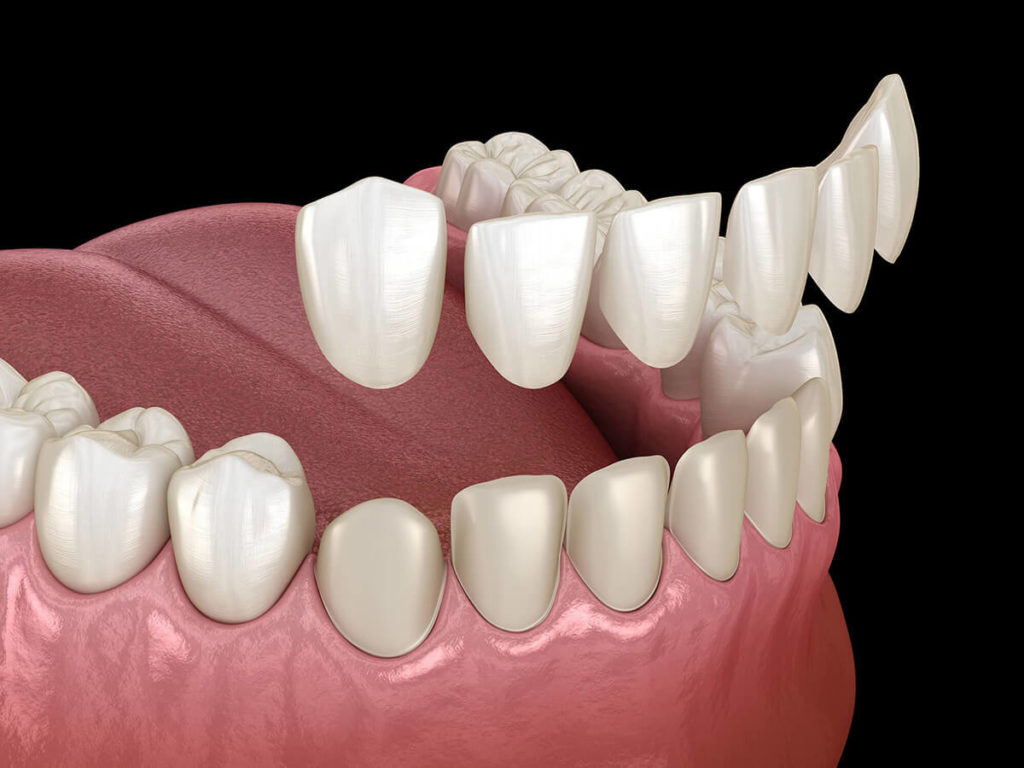Dental Veneers
Discover the transformative power of dental veneers at Amazing Smiles. With both porcelain and composite options available, veneers offer a quick, effective way to enhance your smile's appearance in just two visits.
Dental Veneers in Tinley Park, IL
Dental veneers are a sought-after cosmetic solution that significantly improves the appearance of your teeth by attaching thin, manufactured shells to their front surface. At Amazing Smiles, we provide both porcelain and composite veneers, catering to various preferences and budgets. Veneers are versatile, offering a solution for chips, gaps, cracks, or discoloration, with porcelain veneers being particularly prized for their natural appearance and stain resistance. They are best suited for those looking to enhance their smile without extensive orthodontic work. The process at Amazing Smiles is quick, requiring only two visits for a perfect fit and application. Discover the transformative potential of dental veneers at Amazing Smiles in Tinley Park, IL, and achieve the smile you’ve always desired.

-
How do dental veneers work?
Dental veneers work by covering the front surface of teeth to improve their appearance. Here’s a step-by-step breakdown of how they work:
- Consultation and Planning: Discuss desired results and suitability of veneers (porcelain or composite) with your dentist.
- Tooth Preparation: A small amount of enamel is removed to make room for the veneers.
- Impressions: A mold of your teeth is taken for custom veneer creation.
- Temporary Veneers: Optionally placed while waiting for permanent veneers.
- Bonding: Permanent veneers are checked for fit and color, then bonded to teeth using a special cement activated by light.
- Final Adjustments and Cleaning: Any necessary adjustments are made, and veneers are polished for a final look.
Veneers can correct issues like discoloration, chips, gaps, or misalignments for a durable and aesthetic solution.
-
What is the difference between porcelain veneers and composite veneers?
Porcelain veneers and composite veneers differ primarily in the materials used, their durability, and cost. Porcelain veneers are made from a durable ceramic material that closely mimics the light-reflecting properties and strength of natural teeth. They are resistant to stains and can last anywhere from 10 to 15 years with proper care. On the other hand, composite veneers are made from a resin material that is sculpted directly onto the teeth. While they are less expensive and can be applied in a single visit, they are not as durable as porcelain and are more prone to staining, typically lasting about 5 to 7 years.
-
Veneers vs. crowns—what’s the difference?
Veneers and crowns are both dental restorations used to improve the appearance and function of teeth, but they serve different purposes and cover different portions of a tooth.
- Coverage: Veneers are thin shells that cover only the front surface of the teeth and a small portion of the sides. They are primarily used for cosmetic purposes. In contrast, crowns encapsulate the entire visible part of a tooth, providing a new outer surface for the whole tooth above the gum line.
- Purpose: Veneers are ideal for cosmetic corrections, such as covering discolorations, minor misalignments, chips, or gaps. Crowns, however, are used for teeth that require significant restoration or are in need of structural support after damage, decay, or following a root canal procedure. They are also used to restore teeth with significant structural loss.
- Material and Durability: Both veneers and crowns can be made from porcelain or composite materials, but crowns are also often made from metal or a combination of metal and porcelain. Porcelain crowns and veneers offer a natural look and strong resistance to staining. Crowns generally provide more durability and a longer lifespan than veneers because they cover more of the tooth and are made from thicker materials.
- Tooth Preparation: Preparing a tooth for a crown involves more extensive reshaping compared to a veneer. With crowns, a significant portion of the tooth structure is removed to make room for the crown. Veneers require minimal removal of tooth enamel from the front surface to accommodate the thin veneer layer.
In essence, the choice between a veneer and a crown depends on the specific dental needs of the patient, including the degree of tooth restoration required and cosmetic preferences.
-
How much do dental veneers cost?
More Questions About Dental Veneers?
If you're interested in a dental veneer consultation or have any questions about veneers, contact us today.

